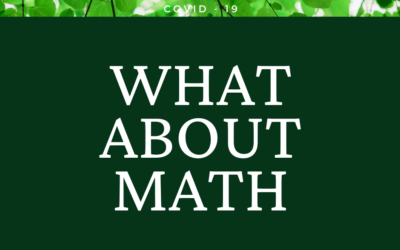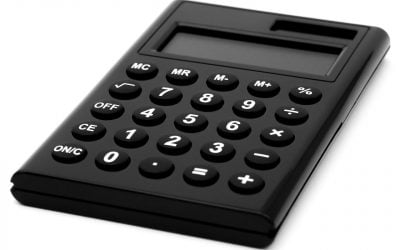With many states ordering schools to remain shut for the remainder of the school year AND the prospect fall quarter may also be waived, there are certainly going to be gaps in math education. Parents and teachers must try to make as intelligent decisions as they can...
“LIKE” Terms in Algebra Don’t Let Words Get in the Way
Many students get confused about "like" terms in Math, but it's not their fault. The terminology is confusing. Purple Math has a nice page on this post. In Algebra, "like terms" refers to terms that have the exact same variable raised to the same power. WATCH YOUTUBE...
Learning Doubles to Boost Math Facts Fluency
Learning doubles math facts can help with number flexibility. After learning how to count and "count on", doubles may be the next skill to learn. Origo Education has a nice post about how to introduce and practice doubling facts with students. First, students look for...
Dyslexia and Math: Understanding Decimals [Premium]
WHY DECIMALS ARE HARD There are many confusing aspects to decimals that are helpful to recognize when helping students. Contrary to working with whole numbers, longer sequences of numbers are not larger than shorter ones. For instance, with whole numbers, 245 is greater than 2, but .0245 is smaller than 2. For math processes involving decimals, multiplying by a decimal number between 0 and 1 is also opposite to what one might be used to. After learning that multiplication is equal groups or repeated addition, multiplying 0.3 x 0.4 = 0.12, a number that is smaller than 0.3 or 0.4. Similarly, dividing by a decimal can result in a number that is bigger than what we started out with, which can seem even more confusing. […]
MATH: The Problem of Showing Work [Premium]
If you live in a Common Core state and your student attends public school chances are they frequently are asked to “show their work”. There can be significant challenges for dyslexic students showing work because to do so requires a great deal of verbal working memory, word retrieval, executive function, and writing, all tasks that can overload each other. As with many curricula, the intentions and logic behind some of the choices seem reasonable; but also like many programs, the implementation has significant flaws so that students can become trapped in the process. Students must conform to a curriculum or fail rather than a curriculum being designed to meet the needs of students. For instance, math teachers Katherine Beals and Garry Garelick reviewed some of […]
Could you have a Math-Gifted Student? [Premium]
It’s really not easy to tell. “Some mathematically gifted students do not demonstrate outstanding academic achievement, display enthusiasm towards school mathematics programs, or obtain top grades in their mathematics classes. It is important to know that there are such students, because their abilities in mathematics are easily overlooked by teachers and parents. In Bloom’s 1984 study, 6 out of 20 world-class mathematicians reported problems in learning to read. Correspondingly, Colangelo, Assouline, Kerr, Huesman, and Johnson studied 34 inventors and found that, in spite of their mathematical strengths, most of them reported weaknesses in writing and verbal areas and more than half described themselves as low achievers in school who failed in at least on subject.” – A. Al-Hroub, University of Cambridge From Rotigel and Fello: […]
Don’t Let Working Memory Prevent Math Learning
We don't spend enough time thinking about how much working memory overload could be impact in learning. In math, the issue is especially dire. CALCULATIONS In the early grades, working memory overload can occur when basic math facts can't be learned to the point of...
Dyslexia and the NEW SAT [Premium]
The new SAT started March 2016. From the New York Times, “What’s true of the writing section is true of the new SAT in general: There’s much more to read. “The most fundamental change is that there are many, many more words,” said Aaron Golumbfskie, education director for PrepMatters. “If you don’t read well and happily, this test isn’t going to be your friend.” Even the math section will require more reading, with fewer questions based on equations and more word problems. Some prompts will present the same type of real-world situations that the Common Core emphasizes — “The recommended daily calcium intake for a 20-year-old is 1,000 milligrams (mg). One cup of milk contains 299 mg….” Mr. Golumbfskie describes the math section as “tighter […]
Teaching Math – No Need for Speed
"What do teachers need to know about teaching math? Strategy over speed, and math thinking over rote memorization." - Stanford Professor Dr Jo Boaler Check out Jo's tips from her new article, Speed and Time Pressure Block Working Memory (below). "I was always deeply...
Strategies for Addressing Math Mistakes [Premium]
Working memory mistakes in math include mistakes such as losing place in problems, errors due to missed steps or key information, calculation errors like near-misses or reversed digits, directional errors, or procedural errors like errors of grouping or carrying. In the video below, teacher Leah Alcala shares how she decided to change how she graded math mistakes in her class. Instead of putting a grade, she highlights mistakes and then gives examples of mistakes and the correct answers in class. Students have a chance to retake their test and better their final scores. This clever approach takes advantage of memory as well as intrinsic motivation and boosts what students learn in math by the time they complete her class. Working memory is such a common […]
MATH: The Problem with Word Problems [Premium]
For dyslexic students, the problem with word problems isn’t just the fact that they have to be read without error – but that there are many aspects of the language commonly found in word problems that will frustrate many dyslexic students if they aren’t explicitly taught where confusions arise. Here are just a few language-based sources of difficult that arise in the reading of math word problems: #1. PASSIVE VOICE Many students need to be explicitly taught about passive voice in grammar. Math problems frequently lapse into passive voice without any attention to the differences that may occur in meaning. For example, consider the differences in 8 divided by 2, 8 is divided into halves, and 8 is divided by half. In the first case, […]
Q: What Are the Best Tests for Dyscalculia? What About the Feifer Test?
Dyscalculia, or a math learning disability is important to identify because formal identification can qualify a student for accommodations both in the classroom and for high stakes tests. It can co-occur with dyslexia and it is under-recognized. We previously reviewed...




![Dyslexia and Math: Understanding Decimals [Premium]](https://www.dyslexicadvantage.org/wp-content/uploads/2020/02/decimals-fractions-shutterstock-400x250.jpg)
![MATH: The Problem of Showing Work [Premium]](https://www.dyslexicadvantage.org/wp-content/uploads/2020/01/April-Newsletter-MATH-the-problem-of-showing-work-400x250.jpg)
![Could you have a Math-Gifted Student? [Premium]](https://www.dyslexicadvantage.org/wp-content/uploads/2020/01/shutterstock_1108861430-Could-you-have-a-math-gifted-student-400x250.jpg)

![Dyslexia and the NEW SAT [Premium]](https://www.dyslexicadvantage.org/wp-content/uploads/2016/02/new-sat-dyslexia-pencil.jpg)

![Strategies for Addressing Math Mistakes [Premium]](https://www.dyslexicadvantage.org/wp-content/uploads/2019/08/math-dyslexia-shutterstock.png)
![MATH: The Problem with Word Problems [Premium]](https://www.dyslexicadvantage.org/wp-content/uploads/2019/08/word-problems-scaled.jpg)














